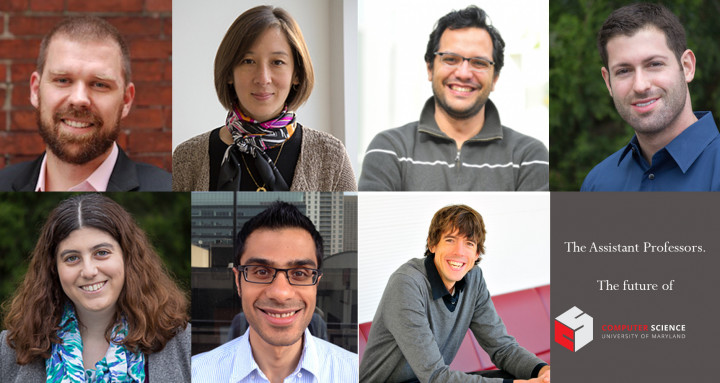The Assistant Professors: The future of Computer Science at UMD
We have seven fantastic assistant professors who are working on innovative and exciting research in Computer Science. Learn more about their work:
David Van Horn: "I work toward making the construction of reusable, trusted software components possible and effective. My research has spanned program analysis; semantics; verification and model-checking; security; logic; complexity; and algorithms."
Marine Carpuat: "I am a member of the CLIP lab, where I do research in Natural Language Processing. I design computational models that use multiple languages as meaning annotation, with the goal to make language processing applications such as machine translation more accurate, more robust and more useful."
Tom Goldstein: "My research lies at the intersection of optimization, machine learning, distributed computing, and image processing. I am interested in fast, low-complexity solutions to real-world model-fitting problems from data analytics and imaging. This means developing massively distributed methods for analyzing big data, as well as simple efficient schemes for small embedded platforms."
Zia Khan: "My group is interested in developing computational approaches to better understand how and when genetic variation leads to variation in gene regulation, both within and across species. Our research, we hope, will better inform studies of complex human traits, such as susceptibility to disease. We are particularly interested in the interplay between regulation of gene expression and the post-translational regulation of proteins. We are primarily a computational group, but we also collaborate closely with others to generate and analyze large scale genomic, proteomic and imaging data sets."
Michelle Mazurek: "My research focuses on computer security, with an emphasis on human factors. I'm interested in understanding security and privacy behaviors and preferences by collecting real data from real users, and then building systems to support those behaviors and preferences."
Hector Corrada-Bravo: His research focuses on statistical and machine learning methods for high-throughput genomic data analysis. This includes pre-processing of measurements from high-throughput assays, disease risk models that integrate high-throughput genomic and other data, and cancer epigenetics and biomarker discovery. Corrada Bravo's research interests also include the development of new methods and tools from multiple areas in the computational and statistical sciences: basic bioinformatics/biostatistics, statistical and machine learning, data management, and numerical optimization.
Jon Froehlich: "My research focuses on designing, building, and evaluating interactive technology that addresses high value social issues such as environmental sustainability, computer accessibility, and personalized health and wellness. This work often involves the entire spectrum of information flow: from sensing physical events, to intelligently interpreting/classifying this data, to building visualizations that inform and motivate behavior."
The Department welcomes comments, suggestions and corrections. Send email to editor [-at-] cs [dot] umd [dot] edu.
